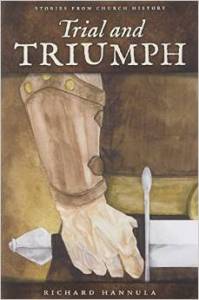Today, homeschoolers have many opportunities to learn a world language. First, a number of excellent curricula exist and online help abounds. While that may not have been true when homeschooling began, it certainly is true now. Many combine a great curriculum with conversational in person or online. Second, many homeschool co-ops and private extension schools such as www.academynorthwest.org provide site-based world language classes. After living in Spain for 17 years, teaching Spanish at Heritage Christian School for two years and then offering site-based classes to homeschoolers it only made sense to expand that to our online services. Http://maggiedail.wixsite.com/spanishanw Photos represent early Spanish classes. Website shows how we offer Spanish classes today. Thirdly, a homeschool high school can study their world language at a community college.
Tag: Academy Northwest
Personal Reflections – 2017 – 14 – How did “Home School / Small School” K-6 work?
For a time we had a small school in our home using the Charlotte Mason approach with elements of classical education. Part of that time, we had an unlikely “class” of almost full time instruction. Our next door neighbor’s nephew lived with them while his father drove a truck for a living. Andrew was in Kindergarten. We had another student in the 6th grade – Drew. Other students formed part of our Charlotte Mason home school learning center. Many in that group grew up with us and later graduated from Academy Northwest. Once that happened, possibly because of a downturn in the economy, our groups were in middle and high school. Those were enjoyable days.
Personal Reflections 2017 – 13 – How did we learn about the Oregon Trail and Lewis and Clark?
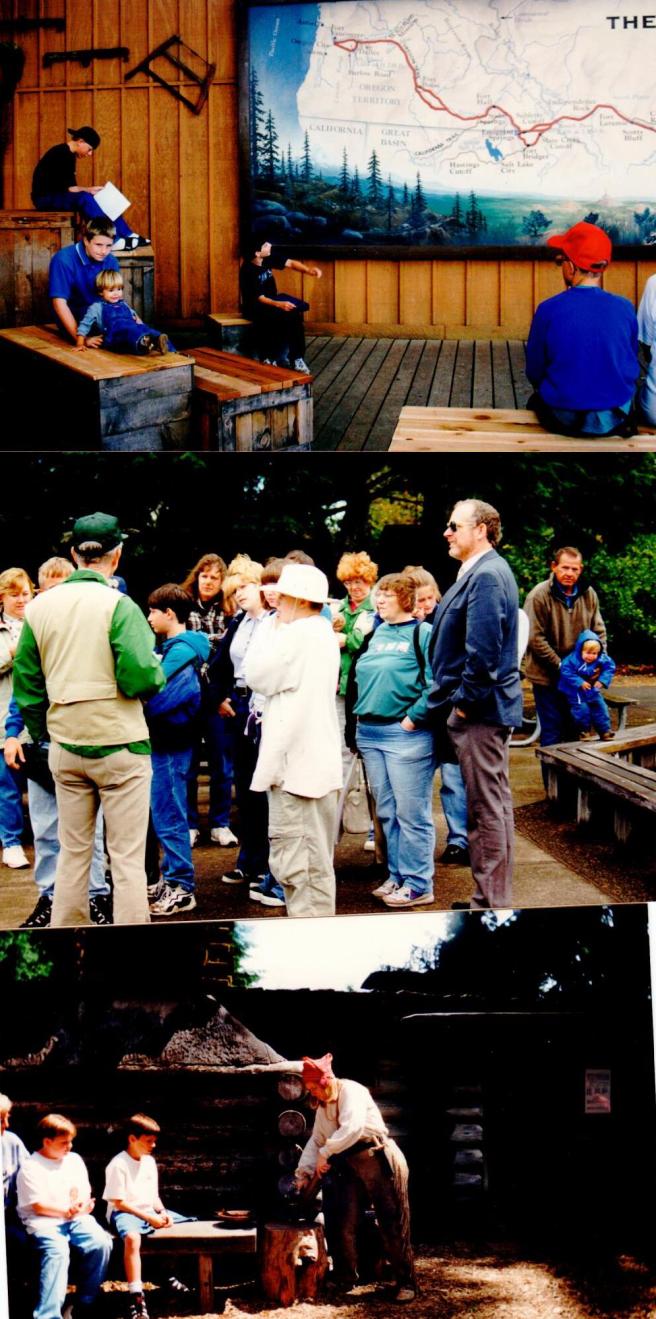
Over the years we did a number of field trips that helped us understand the Oregon Trail, Lewis and Clark’s Journey of Discovery and other Pacific Northwest History highlights. On one occasion we went to Oregon to see The Oregon Trail museum and Fort Clatsop. Further, on another occasion we stayed overnight at the Pioneer Farm closer to home. Each of these occasions provided time to bond with our families and, of course, to learn about our past. We can learn much by understanding how our home developed.
Personal Reflections 2017 – 12 – What about annual testing?
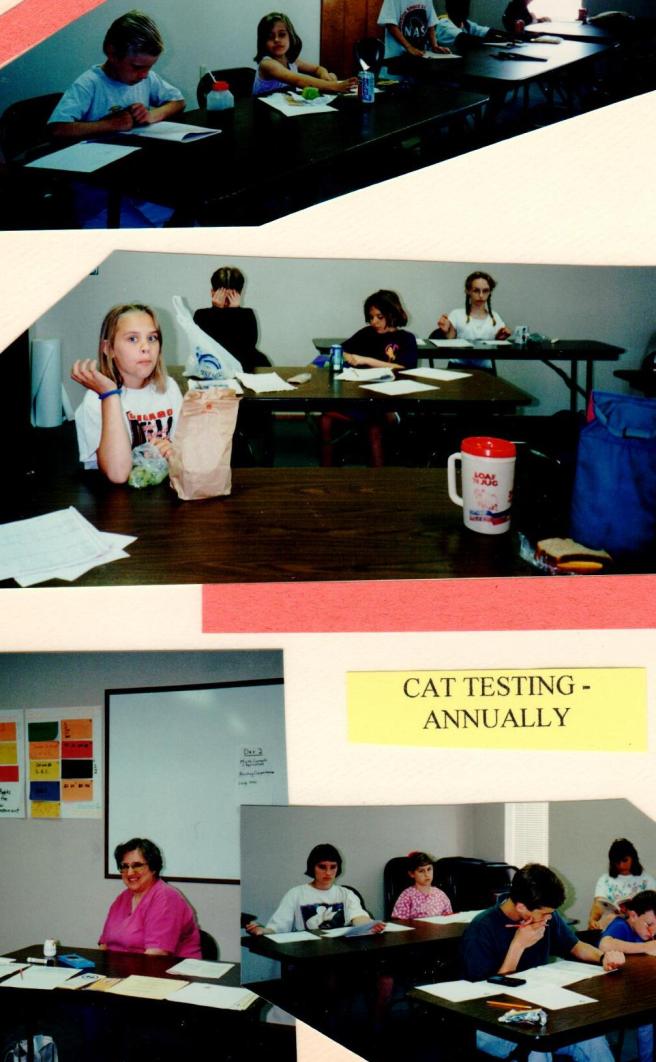 Many state home school laws require some sort of assessment either annually or during specific grades. Even if it is not required, it can provide you with additional helpful information. Most Teacher Consultants of Family Academy / Academy Northwest’s provide standardized assessments and / or non-test assessments because Washington State’s home school law requires home school students to have either a standardized test or a non-test assessment each year.
Many state home school laws require some sort of assessment either annually or during specific grades. Even if it is not required, it can provide you with additional helpful information. Most Teacher Consultants of Family Academy / Academy Northwest’s provide standardized assessments and / or non-test assessments because Washington State’s home school law requires home school students to have either a standardized test or a non-test assessment each year.
Standardized testing usually requires the student to fill in circles on an answer sheet. Scoring is according to norms (sample group of students) and produce grade equivalents, percentiles and stanines relative to that sample group of students. This requires that the test be given under specific guidelines prescribed by the test makers. Examples of these standardized tests include: California Achievement Test (CAT), Stanford Achievement Tests (SAT – not to be confused with the college entrance SAT of College Board) and Iowa Test of Basic Skills. These tests take 2-3 days of testing.
In the Washington homeschool, a non-test assessment must be administered by a certified teacher currently working in the field of education. However, the law does not define that assessment. Therefore, when looking for a test provider, be sure and ask what the process entails and what kind of information the parent will receive. These assessments usually are only one session.
Our learning center administered group testing of California Achievement Tests for many years. We also provided one-on-one settings for SAT and ITBS. Further, we offered non-test assessments in person for years and continue to provide non-test assessments via Skype.
Personal Reflections 2017 – How did Academy Northwest look after 10 years of having its own graduation ceremony?
Graduation, 2006 – Academy Northwest’s graduation program tells the story. All over Western Washington we have “learning centers” operated by Teacher Consultants. Our title, Teacher Consultants includes two of our functions. We teach classes to our students and we consult with their parents. Our model forms a triangle; each part has responsibilities and benefits. Visit our website to see the “Family Academy Way” which illustrates how our affiliate school, Academy Northwest, operates.
Here is an excerpt from that page:
The Family Academy Way includes, but is not limited to:
- Learning within meaningful relationships
- Accountability
- Individualized learning plans
- Professional guidance
- Documentation of completed work (transcripts)
- High standards (raising the bar)
- Personalized help
- Academic and personal excellence
- Reinforcement of family values
Personal Reflections -2017 – 10 – What part do field trips and libraries play in homeschooling?
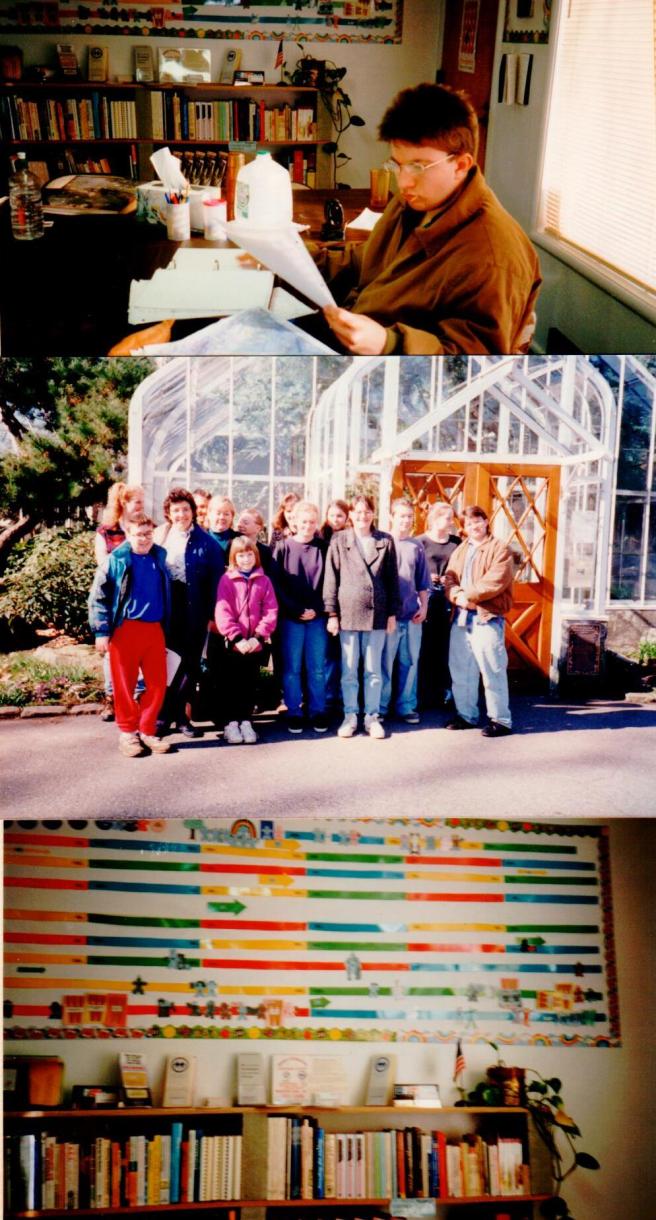
If you ask the students, I would venture to say that field trips played a big part in their learning. Over the years we often visited the Karpeles Manuscript Library Museum and then we would go across the street to see the Botanical Conservatory. The Karpeles had rotating exhibits on many topics – always interesting and sometimes they fit right in with what we were studying. Then a stop to see exotic plants at the W.W. Seymour Botanical Conservatory in Wright’s Park in Tacoma topped off the day.
While our students needed to visit the public library for much of their research we did provide them with a lending library that grew over the years. When we moved to Oklahoma, much of our library found a new home in Arrow Academic Center, another Academy Northwest learning center in Bothell.
Some of our activities included a group of students and other included one-on-one studies.
Personal Reflections – 2017 – 9 – What happens when Monet, Copernicus, Newton, Bunyan, Boyle and Mozart to come to visit?

Our students learned about different historical figures through reading biographies. Also, they gained public speaking / acting skills. You probably notice that we had a broad range of ages, 7th – 12th, in our learning center during those years. It is great to know that biographies are available at different reading levels so each student could work on his own level and participate with the class. Some students could have a low reading level, but still presented well in class.
Personal Reflections – 2017 – 5 What can a small learning center do?

From experience we know that small learning centers can do many things that larger learning centers and schools can do. One thing we did somewhere along the line was a learning center “History Day” as part of our history studies. Our administrator, Candice Childs, came to judge the entries. We had much to learn but we had made the first step.
On another occasion, we had a Toastmaster member come to teach us the art of speaking. Even this Teacher Consultant participated as a student. Sadly, this precious lady planned to retire so we could not get her to come for future students.
Such valuable experiences our students accessed!
Personal Reflections 2017 – 3 – In what ways do parents participate in the education of their children?
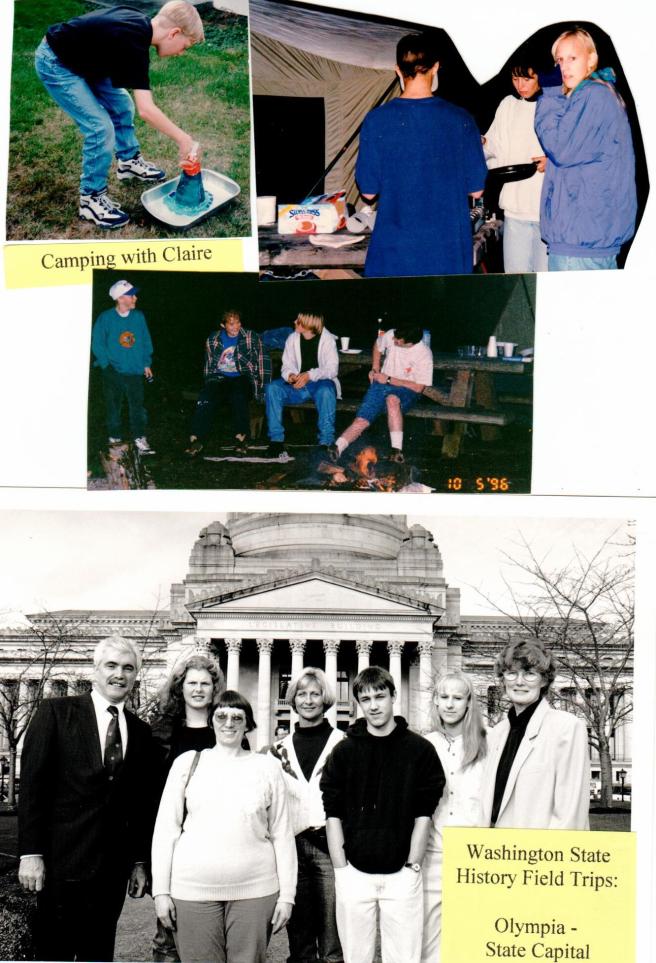
As our group began to grow we branched out with more activities. One memorable trip was to Olympia to see the State Capital, meeting with the late Michael Carrell then State Representative and later State Senator. Also, pictured is former State Representative, Gigi Talcott. Further, we went camping with Claire. Claire, a mom of one of our students, contributed greatly to our science program taking over much of the Biology lab work with the students. If I started listing all of the contributions of all of the parents, I would surely forget many. One father of two students actually enclosed our one car garage so that it could be our “learning center” for about a year. We outgrew it quickly. For a while it was our living room, for a while our bedroom and finally it was Ronnie’s office. At this time Family Academy and its affiliate school comprised one organization. Often we have said that the students preferred the Academy Northwest name because it represented the official private school status. At the same time the parents preferred the name Family Academy because the parents remain the primary teachers while the Teacher Consultants come along side to provide support for the students and their parents.
Deuteronomy 6:6 “And these words which I command you today shall be in your heart. 7 You shall teach them diligently to your children, and shall talk of them when you sit in your house, when you walk by the way, when you lie down, and when you rise up.
Follow this blog for the rest of the story.
Sentence Variety in Writing – The Reformation
Our students can write extended paragraphs; now they are ready to learn variety in writing sentences: Simple, Compound and Complex sentences all have a place in mature writing. Students begin by writing the simple sentence – Subject + Verb and sometimes + Object – one complete thought. These provide a good beginning for students, but as students mature they need to expand to using Compound Sentences (Independent Clause + conjunction + Independent Clause). Later, Complex sentences (Independent Clause + one or more Dependent Clauses with coordinating conjunctions (in either order) enter the student’s writing. Extended paragraphs should have a variety of these types of sentences. Too many simple sentences make for an elementary, stilted paragraph. While, a good beginning, our end goal is for variety. Likewise, too many of the compound or complex sentences can lose the reader. *
We continue to draw on the excellent book by Richard Hannula, Trial and Triumph – Stores From Church History as writing prompts. These mini-biographies work well with learning to write. Paragraph samples for this lesson come from the section on the reformation.
Martin Luther – Father of the Reformation – 1483-1546
In early, 1517 Tetzal, a representative of Pope Leo, arrived in Wittenberg, Germany to tell the people of a way to receive forgiveness of their sin and the sin of their loved ones who were in “purgatory.” By the authority of the Pope, he sold “indulgences” with the simple refrain: “As soon as the coin in the coffer rings, the soul from purgatory springs.” Many believed and bought these “indulgences.” Martin Luther, a young priest, who preached at the great Castle Church, knew better. He preached from God’s Word, “The just shall live by faith,” not by works or “indulgences.” On October 31, 1517, Luther posted 95 arguments (theses) on the Castle Church door to open dialog among the church leaders and people of Wittenberg. Instead, all of Europe entered the discussion. Pope Leo responded with declarations of warnings for Luther. While many followed Luther, others continued to follow the Pope’s teaching. Finally, Charles the Emperor, set up a meeting in Worms (Diet of Worms) where Luther faced church leaders. They gave him the opportunity to renounce his writings. His response: “I cannot renounce these works unless I am shown from the Scripture where I am in error. If I am shown my error from Scripture, I will be the first one to throw my books into the fire.” Further, “Unless I am convicted by Scripture and plain reason – I do not accept the authority of popes and councils alone, for they have contradicted each other – my conscience is captive to the Word of God. I cannot and will not recant anything, Here I stand, I cannot do otherwise, so help me God.” He was condemned as a heretic and sentenced to death. His friends, however, kidnapped him and gave him refuge while he continued to write and translate the Bible into German. He died at the age of 62.
John Calvin – Theologian of the Reformation – 1509-1563
Having escaped from the King of France, young John Calvin entered Geneva, Switzerland. He intended to stay one night en route to a place where he could study and write. However, William Farel visited him and boldly told him that he must stay and help in the reformation work in Geneva. After much argument, Calvin agreed to stay believing that God had used Farel to change his course. While in Geneva, he preached daily, visited the sick, started a college and wrote. Today, Calvin’s The Institutes of the Christian Religion still holds an important place in the body of Christian literature. Calvin and Farel participated in a religious debate in Lausanne. They faced religious leaders who claimed that they were not following the teachings of the church. During the first three days, Farel did all of the speaking. Finally, on the last day when one of the religious leaders specifically stated that they were not following church fathers such as Augustine, Turtullian and others. Calvin rose, and without looking quoted verbatim long passages from these leaders who taught the same teachings as Calvin and Farel. One of the religious leaders, confessed that he had been wrong and left the church along with many others in the days that followed. Even when bedridden, Calvin worked. Finally, his frail body failed and he died. Dying, he said to Farel, “Christ is our reward in life and death.”
John Knox – Scottish Reformer – c 1514-1572
John Knox grew up in a church that followed the teachings of the Pope. Along with many others in Scotland, he read the works of Martin Luther and other reformers. More importantly, he read the Bible. Knox trusted Christ having read John 17, “Now this is eternal life: that they may know you are the only true God, and Jesus Christ, who you have sent.” Scotland was divided and Knox was sentenced to the galleys of ships chained along with hardened criminals for only trying to reform the church. He suffered the harsh conditions in the galleys for nearly two years. English Protestants intervened on his behalf. Knox preached in England regularly to King Edward VI and his court. Upon the sudden death of King Edward VI, Mary Tudor or “Blood Mary” took over with the intent of returning England to Catholicism. After a twelve year exile, Knox returned to Scotland. During his exile, he had been condemned as a heretic. Even at the threat of death many swarmed to hear this great reformer. In a confrontation with the queen, he spoke boldly: “I must obey God. His Word commands me to speak plainly and flatter no one on the face of the earth.” Weakened by his harsh treatment in the galleys, he suffered many ailments. Even so, he preached to the day of his death having been carried to the
*What is the difference between simple, compound and complex sentences?






